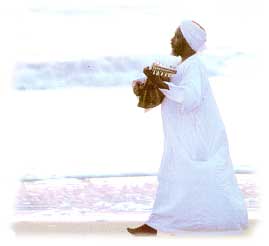A Wish
Sounds True (www.soundstrue.com)
 Along the Nile, below the high dam at Aswan, Egyptians refer to young boys beginning their "periods." The reference is to the blood red urine that results from billharzia, a disease caused by parasites carried by snails who live in the now slower-moving Nile waters. Billharzia is just one environmental consequence of the dam. If you are old enough, you likely remember the frequent news photos through most of the '60s documenting the engineering feats involved in building the dam or the removal of the gigantic ancient sculptures at Abu Simbel. Far less apparent was the decimation of the Nubian homeland as the waters of the 300-mile-long Lake Nasser rose. One hallmark of the twentieth century is the post-colonial subsuming of innumerable ethnic identities in the crafting of the modern world. The Nubians of the upper Nile are one such group. Hamza El Din's own village, Toshka, was flooded by the waters of Lake Nasser. A "world citizen," Hamza's music is a testament to the hubris of engineering, the price people often pay for it, and a celebration of an ancient culture that was as much a creation of the Nile as the Egyptian cultures further down river.
Along the Nile, below the high dam at Aswan, Egyptians refer to young boys beginning their "periods." The reference is to the blood red urine that results from billharzia, a disease caused by parasites carried by snails who live in the now slower-moving Nile waters. Billharzia is just one environmental consequence of the dam. If you are old enough, you likely remember the frequent news photos through most of the '60s documenting the engineering feats involved in building the dam or the removal of the gigantic ancient sculptures at Abu Simbel. Far less apparent was the decimation of the Nubian homeland as the waters of the 300-mile-long Lake Nasser rose. One hallmark of the twentieth century is the post-colonial subsuming of innumerable ethnic identities in the crafting of the modern world. The Nubians of the upper Nile are one such group. Hamza El Din's own village, Toshka, was flooded by the waters of Lake Nasser. A "world citizen," Hamza's music is a testament to the hubris of engineering, the price people often pay for it, and a celebration of an ancient culture that was as much a creation of the Nile as the Egyptian cultures further down river.
Hamza El Din is a legendary oud master. At a time when many of the new releases of Middle Eastern derivation take advantage of up-tempo tabla and infuse them with pop, rock and new age tinkering, Hamza tacks another direction and allows the underlying music to come forth. He employs clean melodic lines that are stripped to their essences and often accompanied by his deep, resonant vocals that evoke North African musical ideals. Alone, his voice and instrument are a beautiful combination ("Anesigu"). A rural mood is captured on "Sunset," an instrumental piece of variations on a composition by Riad El Sumbati and originally prepared as a work for Oum Kulthum. A poem by Ilia Abu Madi is the basis for "Griffin 2," accompanied by the nay playing of Amy Cyr and doumbek and clay drums of Hani Naser. Vocals plus traditional syncopated handclapping and rhythmic cycles capture the festive wedding feel on "Nagrishad." The poignancy of A Wish is captured in the title song, a portion of which will convey its mood: "When the flooded lands return, green as they once were east and west of the banks of the Nile, date palms will stand tall filled with fruit, filled with white, red and brown fruit, in the country where we measured out the dates, sharing the fruit among ourselves, where once we sat and chatted."
Here in the Pacific Northwest we see bumper stickers that read "Asphalt is Forever!" Truth is, it's not. After almost thirty years working in the Middle East as an archaeologist, I have witnessed how time and the elements treat human engineering endeavors and even high dams shouldn't be considered permanent fixtures. What that may mean for Nubia's future is anyone's guess. Hamza El Din's A Wish is something to savor for now. - Richard Dorsett
Available at cdRoots
